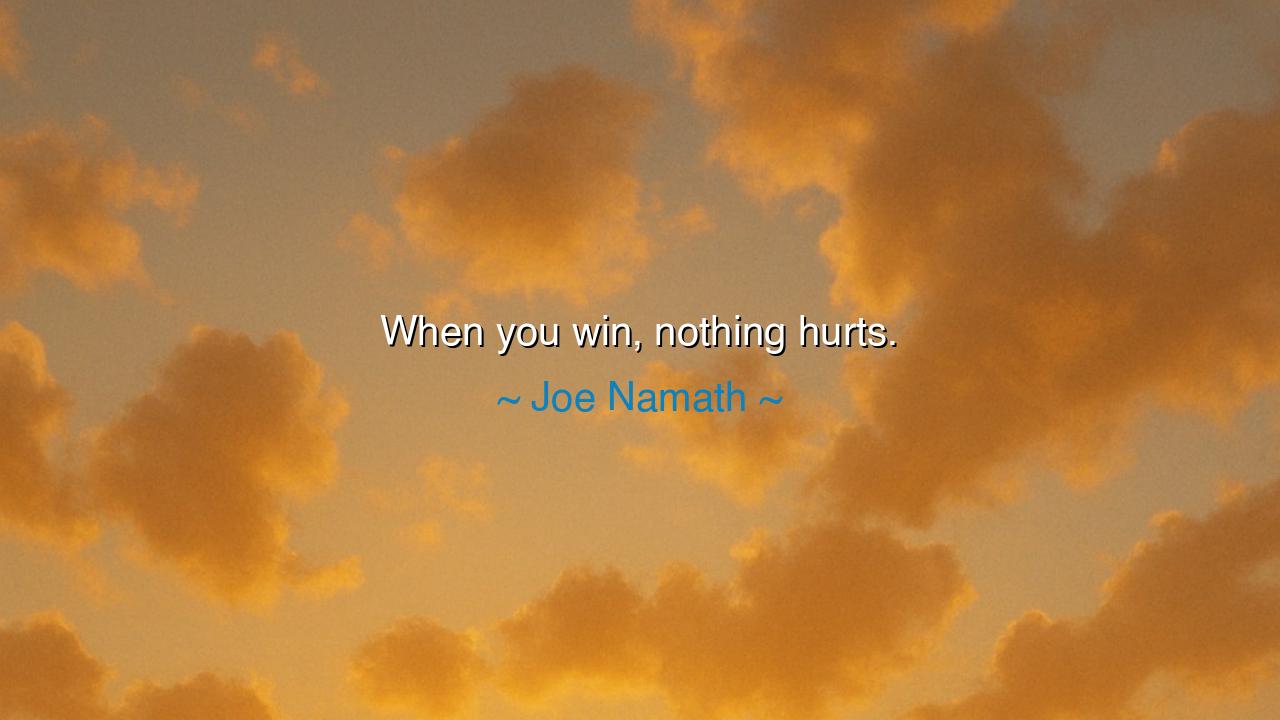
When you win, nothing hurts.






The words of Joe Namath, “When you win, nothing hurts,” rise like a cry from the battlefield of both sport and life. They are not spoken lightly, for Namath himself bore the bruises and the torn flesh of football, a game that punishes the body and tests the spirit. In his utterance, he unveils a truth known by warriors and dreamers alike: that the fire of victory can burn away the pain of struggle. The body may ache, the bones may splinter, but in the hour of triumph, suffering is forgotten, and only the glory remains.
To understand this saying, we must first know its origin. Joe Namath, famed quarterback of the New York Jets, spoke these words out of lived experience. Known as “Broadway Joe,” he carried his team to a legendary victory in Super Bowl III, fulfilling a bold guarantee that few believed. In that moment, all the doubt, the hits, the sacrifices, and the pain of the game faded into nothingness before the triumph of his promise kept. Thus the words were born not as philosophy from a scholar’s desk, but as testimony from a man who bled and rose victorious.
The ancients too would have understood this truth. Consider the Spartans at Thermopylae, standing against the Persian tide. Their bodies were pierced, their strength worn, yet their courage transformed agony into honor. They did not cry of wounds, for they had already “won” in spirit: they had bought Greece the time it needed. So too Namath declares that pain is powerless against the balm of achievement. Victory is a shield, numbing the wounds of labor and trial.
But there is danger in misreading this wisdom. Namath does not say that pain ceases to exist; he says only that it ceases to matter. The blows still fall, the scars still remain, but the mind, exalting in triumph, refuses to bow to them. The lesson here is not to despise suffering, but to understand its place. Pain is the price of striving, but when you reach the summit, it becomes a small and forgotten thing. Thus the saying is not an escape from struggle, but a call to endure it for the sake of the greater prize.
History offers us another tale in this spirit: that of Thomas Edison, who failed thousands of times in his quest to harness the light of electricity. Each attempt was a wound to pride, a blow to patience. But when the bulb finally shone, when light pushed back the darkness, all the years of pain and ridicule were consumed in the flame of triumph. Indeed, for him too, when he won, nothing hurt. Victory transforms failure into foundation stones and pain into memory.
Therefore, let these words instruct the seeker of wisdom: do not fear the cost of effort, for pain is temporary but triumph eternal. Keep your gaze fixed on the end, and let each wound become a mark of your devotion to the cause. When you stumble, when you are struck down, do not count the hurt too dearly. For if you rise and achieve what you set out to do, all the aches of the journey will be drowned in the sweetness of fulfillment.
Practical steps arise from this truth. Endure hardship with patience; do not give up when weariness tempts you. Train your body, but more importantly, train your mind to focus on the prize, not the pain. Let your vision of victory be so bright that the shadows of discomfort vanish before it. In moments of weakness, remind yourself: one day, when you have conquered, none of this will matter. The aches will fade, the wounds will heal, but the memory of triumph will endure like a crown of fire upon your brow.
And so the teaching endures: *“When you win, nothing *hurts.” For triumph is a balm, and success a healer of wounds. Those who strive with courage and endure with patience shall know this truth: pain is fleeting, but the glory of victory endures forever.






AAdministratorAdministrator
Welcome, honored guests. Please leave a comment, we will respond soon